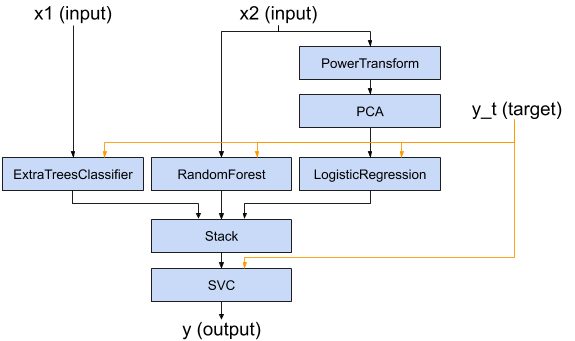alegonz / Baikal
Programming Languages
Projects that are alternatives of or similar to Baikal
A graph-based functional API for building complex scikit-learn pipelines
baikal is written in pure Python. It supports Python 3.5 and above.
Note: baikal is still a young project and there might be backward incompatible changes. The next development steps and backwards-incompatible changes are announced and discussed in this issue. Please subscribe to it if you use baikal.
What is baikal?
baikal is a graph-based, functional API for building complex machine learning pipelines of objects that implement the scikit-learn API. It is mostly inspired on the excellent Keras API for Deep Learning, and borrows a few concepts from the TensorFlow framework and the (perhaps lesser known) graphkit package.
baikal aims to provide an API that allows to build complex, non-linear machine learning pipelines that look like this:
with code that looks like this:
x1 = Input()
x2 = Input()
y_t = Input()
y1 = ExtraTreesClassifier()(x1, y_t)
y2 = RandomForestClassifier()(x2, y_t)
z = PowerTransformer()(x2)
z = PCA()(z)
y3 = LogisticRegression()(z, y_t)
ensemble_features = Stack()([y1, y2, y3])
y = SVC()(ensemble_features, y_t)
model = Model([x1, x2], y, y_t)
What can I do with it?
With baikal you can
- build non-linear pipelines effortlessly
- handle multiple inputs and outputs
- add steps that operate on targets as part of the pipeline
- nest pipelines
- use prediction probabilities (or any other kind of output) as inputs to other steps in the pipeline
- query intermediate outputs, easing debugging
- freeze steps that do not require fitting
- define and add custom steps easily
- plot pipelines
All with boilerplate-free, readable code.
Why baikal?
The pipeline above (to the best of the author's knowledge) cannot be easily built using scikit-learn's composite estimators API as you encounter some limitations:
- It is aimed at linear pipelines
- You could add some step parallelism with the ColumnTransformer API, but this is limited to transformer objects.
- Classifiers/Regressors can only be used at the end of the pipeline.
- This means we cannot use the predicted labels (or their probabilities) as features to other classifiers/regressors.
- You could leverage mlxtend's StackingClassifier
and come up with some clever combination of the above composite estimators
(
Pipelines,ColumnTransformers, andStackingClassifiers, etc), but you might end up with code that feels hard-to-follow and verbose.
- Cannot handle multiple input/multiple output models.
Perhaps you could instead define a big, composite estimator class that integrates each of the pipeline steps through composition. This, however, most likely will require
- writing big
__init__methods to control each of the internal steps' knobs; - being careful with
get_paramsandset_paramsif you want to use, say,GridSearchCV; - and adding some boilerplate code if you want to access the outputs of intermediate steps for debugging.
By using baikal as shown in the example above, code can be more readable, less verbose and closer to our mental representation of the pipeline. baikal also provides an API to fit, predict with, and query the entire pipeline with single commands.







